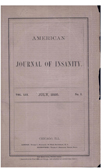A comparative study of Vietnamese Amerasians, their non-Amerasian siblings, and unrelated, like-aged Vietnamese immigrants
Abstract
OBJECTIVE: The authors compared the personal histories, levels of psychological distress, and adaptation to American life of Vietnamese Amerasians (N=140), their non-Amerasian siblings (N=71), and a group of unrelated, like-aged Vietnamese immigrants (N=118). METHOD: Subjects completed two self-administered symptom checklists and provided demographic and personal history data. RESULTS: Vietnamese Amerasians differed significantly from the other two groups on measures of alcohol use, number of hospitalizations, years of education, childhood trauma, perceived effects of trauma, and score on the Vietnamese Depression Scale. The Amerasians did not, however, differ on measures of social support or in their success at adapting to life in the United States. CONCLUSIONS: Despite multiple disadvantages, Vietnamese Amerasians appear to be adapting to life in the United States as well as other like-aged Vietnamese immigrants.
Access content
To read the fulltext, please use one of the options below to sign in or purchase access.- Personal login
- Institutional Login
- Sign in via OpenAthens
- Register for access
-
Please login/register if you wish to pair your device and check access availability.
Not a subscriber?
PsychiatryOnline subscription options offer access to the DSM-5 library, books, journals, CME, and patient resources. This all-in-one virtual library provides psychiatrists and mental health professionals with key resources for diagnosis, treatment, research, and professional development.
Need more help? PsychiatryOnline Customer Service may be reached by emailing [email protected] or by calling 800-368-5777 (in the U.S.) or 703-907-7322 (outside the U.S.).



